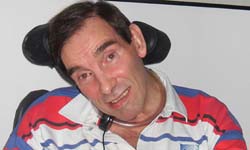 The controversial question of euthanasia has been brought to the fore once again in recent months as Tony Nicklinson took his fight for a dignified death to the courts. Last week Mr Nicklinson’s application to the courts was denied, and a week later, after refusing nourishment or medical treatment, he died from pneumonia. This debate, like others that deal with an issue that sits at the crossroads of religious and ethical matters, has brought about both intelligent discussion and a recession into vitriol, hate and judgment.
The controversial question of euthanasia has been brought to the fore once again in recent months as Tony Nicklinson took his fight for a dignified death to the courts. Last week Mr Nicklinson’s application to the courts was denied, and a week later, after refusing nourishment or medical treatment, he died from pneumonia. This debate, like others that deal with an issue that sits at the crossroads of religious and ethical matters, has brought about both intelligent discussion and a recession into vitriol, hate and judgment.
In 2005, Mr Nicklinson suffered a stroke that left him in what is known as ‘Locked-in Syndrome’. This is a condition where the patient is alert and present mentally, but is physically unable to move or verbally communicate. Quite literally locked inside his body since the stroke, Mr Nicklinson has lived in an unbearable state, unable to take care of himself and in need of constant care.
In January of this year, Mr Nicklinson petitioned the High Court to assert that any doctor willing to end his life would not be held accountable for or charged with murder. After months of battling this question in the High Court the ruling came down last week that this was not to be. Mr Nicklinson is said to have been devastated by the court’s decision. He was fighting to have the right to choose when he dies. He stated that this did not mean that he wanted to die immediately, but rather that the choice of when would be his.
Mr Nicklinson’s case was particularly interesting because locked-in syndrome is not terminal; he could have lived for years still locked in his body while his mind was as active and as alert as ever. This is almost certainly a terrible fate; a fate where your body quite literally becomes a prison. So with full mental competence Mr Nicklinson decided to fight for the right to choose when he died.
Mr Nicklinson’s argument was based on the premise that his rights were being violated by British law. The European Convention on Human Rights guarantees Mr Nicklinson the right to ‘private and family life’, which at its core is a question of whether a person has autonomy or not. On the grounds of personal autonomy, Mr Nicklinson attempted to argue that to deny his right to die was a fundamental denial of this human right. It would seem sensible to assert that British law would be in favour of the personal autonomy of its citizens, but this has proved not to be the case. A question could also be posed about whether this High Court judgment places a limitation on personal autonomy.
Nicklinson signed an order in 2004 denying any life-saving treatment, so when he contracted pneumonia after the court judgment and refused food, there was nothing to be done. There seems to be uncertainty about what the consequences of this case will be, but it seems unlikely that it will have any drastic effect on the UK’s constitutional position on euthanasia.
There are only a handful of European countries which permit euthanasia. This includes Belgium, the Netherlands and Luxembourg, but it is only Switzerland which allows foreigners to come to a clinic close to Zurich to die. The complexities of this debate inhabit medical, religious and ethical bounds, and are hotly debated in classrooms, living rooms, and many other public and private spaces all over the world. In an age when personal privacy and personal space is becoming increasingly limited, surely the right to personal autonomy in all areas is a right worth discussing and fighting for.

